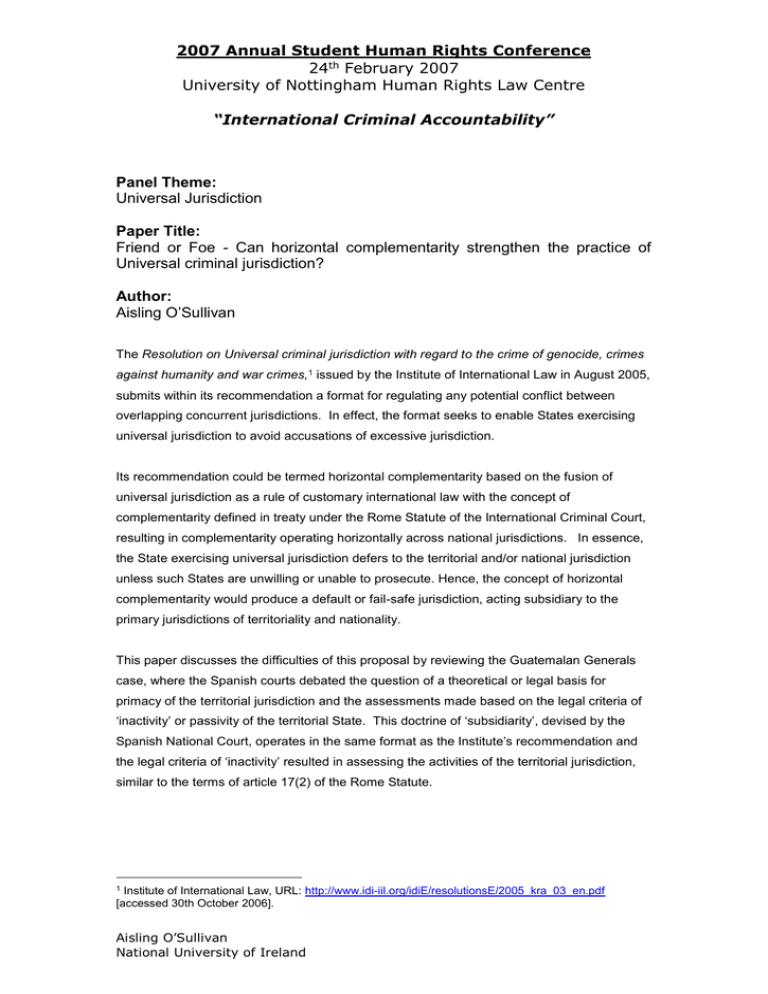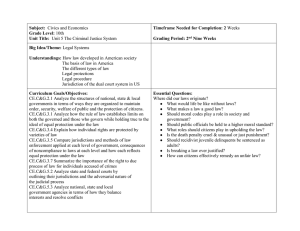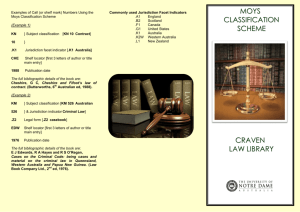Friend or foe? Can Horizontal Complementarity strengthen the Practice of Universal Jurisdiction?
advertisement

2007 Annual Student Human Rights Conference 24th February 2007 University of Nottingham Human Rights Law Centre “International Criminal Accountability” Panel Theme: Universal Jurisdiction Paper Title: Friend or Foe - Can horizontal complementarity strengthen the practice of Universal criminal jurisdiction? Author: Aisling O’Sullivan The Resolution on Universal criminal jurisdiction with regard to the crime of genocide, crimes against humanity and war crimes,1 issued by the Institute of International Law in August 2005, submits within its recommendation a format for regulating any potential conflict between overlapping concurrent jurisdictions. In effect, the format seeks to enable States exercising universal jurisdiction to avoid accusations of excessive jurisdiction. Its recommendation could be termed horizontal complementarity based on the fusion of universal jurisdiction as a rule of customary international law with the concept of complementarity defined in treaty under the Rome Statute of the International Criminal Court, resulting in complementarity operating horizontally across national jurisdictions. In essence, the State exercising universal jurisdiction defers to the territorial and/or national jurisdiction unless such States are unwilling or unable to prosecute. Hence, the concept of horizontal complementarity would produce a default or fail-safe jurisdiction, acting subsidiary to the primary jurisdictions of territoriality and nationality. This paper discusses the difficulties of this proposal by reviewing the Guatemalan Generals case, where the Spanish courts debated the question of a theoretical or legal basis for primacy of the territorial jurisdiction and the assessments made based on the legal criteria of ‘inactivity’ or passivity of the territorial State. This doctrine of ‘subsidiarity’, devised by the Spanish National Court, operates in the same format as the Institute’s recommendation and the legal criteria of ‘inactivity’ resulted in assessing the activities of the territorial jurisdiction, similar to the terms of article 17(2) of the Rome Statute. 1 Institute of International Law, URL: http://www.idi-iil.org/idiE/resolutionsE/2005_kra_03_en.pdf [accessed 30th October 2006]. Aisling O’Sullivan National University of Ireland 2007 Annual Student Human Rights Conference 24th February 2007 University of Nottingham Human Rights Law Centre “International Criminal Accountability” The debate on theory or legal basis varied from a highly questionable interpretation of the article VI of the Genocide Convention as imposing subsidiarity, to the concurrent jurisdictions as a legal basis and further, concurrent jurisdictions, justifying primacy on sound criminal policy. On assessment, the Spanish courts came to distinct conclusions based on the evidence before the court, signalling caution regarding the application of assessment criteria by national judiciary. In conclusion, the Guatemalan Generals case emphasises the need for further theory and practice on the recommendation for horizontal complementarity. Horizontal complementarity may prove to strengthen the practice of universal jurisdiction by ensuring accusations of excessive jurisdiction are avoided, given the obvious respect paid to territorial sovereignty. But a more general and consistent state practice is required to progress this concept from a proposal for criminal policy to a clear legal basis under general international law. Further, the Guatemalan Generals case signals some caution with respect to the attractiveness of horizontal complementarity, given the potential for rigorous application of the legal conditions for assessment, which could unjustifiably preclude the exercise of universal jurisdiction by national courts. One note of optimism, however, would be the potential influence of the ICC, when making its determinations under article 17(2), as guidance to national judiciary in the event horizontal complementarity becomes an accepted practice of States. Aisling O’Sullivan National University of Ireland







